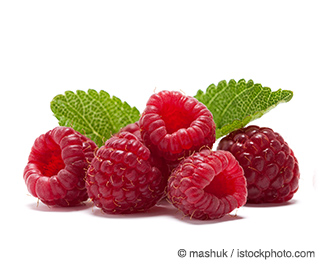Raspberry Renown
Botanical name: Rubus idaeus

Wild raspberries have been growing for thousands of years in different areas around the world, including Alaska, Eastern Asia, Hawaii, Europe and North America.1 Today, the raspberry industry is thriving, producing 684,000 metric tons in 2019, according to statistics from the International Raspberry Organization.2 Some of the highest producers of raspberries include Serbia, Poland, the U.S., Mexico and Chile.3
While there are more than 200 species of raspberry, they're divided into two main types: red and black.4 There are also purple raspberries, which comes from a hybridization of the red and black varieties, as well as yellow raspberries, which results from a mutation that prevents raspberries from having a red color.5
If you've ever tried picking raspberries, you know their plants bear thorns, so be sure to wear gloves.6 When buying, examine the berries for freshness and rinse them gently just before eating. Raspberries are very versatile, and can be added to smoothies, yogurt, sauces, garden salads, fruit salads and salad dressings.
Health Benefits of Raspberries
Cancer-fighting benefits of raspberries (and other berries) have long been attributed to their antioxidant and anti-inflammatory phytonutrients.7 Ellagitannins,8 for instance, may help regulate signals sent to potential cancer cells, keeping them benign and curtailing the number of those in existence by sending signals that encourage cell death (also known as apoptosis).9
Ellagic acid is another antioxidant in raspberries that may help lower the risk for diseases associated with oxidative stress10 and inflammation, such as insulin resistance, diabetes, atherosclerosis and nonalcoholic fatty liver disease.11 Phenolic flavonoids like quercetin, gallic acid, cyanidins, pelargonidins, apigenin and kaempferol are also among the most prominent compounds in raspberries.12,13
Vitamin C, a powerful natural antioxidant that may help zap free radicals and fight infection,14 is one of the vitamins present in this fruit in high amounts.15 Together, these free radical-fighting compounds bring raspberries' oxygen radical absorbance capacity (ORAC) value to one of the highest of all fruits at 4,882 per 100 grams.16
Magnesium is also present in raspberries.17 This mineral is involved in a variety of fundamental physiological functions, including muscle contraction, glycemic control and blood pressure.18 Other nutrients that are worth mentioning include vitamins A, E and K,19 as well as potassium,20 a mineral that may help control heart rate and blood pressure levels.21,22
However, raspberries contain oxalates23 — much more in black varieties than in red24 — which may discourage large black raspberry intake. The problem with oxalates is that they link with calcium and can crystallize over time, causing health problems like the formation of kidney stones.25
In addition, raspberries contain fructose, which can be harmful to your health in excessive amounts, so it's best to consume this fruit in moderation. Read more about growing raspberries at home and the health benefits they can offer.
Raspberry Nutrition Facts
Serving Size: 3.5 ounces (100 grams), raw26
| Calories |
52 |
|
| Total Fat |
0.65 g |
|
| Saturated Fat |
0.019 g |
|
| Trans Fat |
|
|
| Cholesterol |
0 mg |
|
| Sodium |
1 mg |
|
| Total Carbohydrates |
11.94 g |
|
| Dietary Fiber |
6.5 g |
|
| Sugar |
4.42 g |
|
| Protein |
1.20 g |
|
| Calcium 25 mg |
Iron |
0.69 mg |
Studies Done on Raspberries
In a study published in the Nutrition and Cancer journal, black raspberry extracts (RSE) were found to help slow the growth and even induce apoptosis on breast cancer cells while helping protect against radiation.27
Another study also found that stomach, prostate, intestinal and breast cancer cells were inhibited when patients were tested with an array of different berry juices, including raspberry, black currant, white currant, gooseberry, velvet leaf blueberry, low-bush blueberry and other lesser-known berry types. While some berries had little or no effect on cancer cells, researchers concluded that including berry juices in the diet might prove chemopreventive.28
Raspberry Healthy Recipes:
Raspberry, Avocado and Mango Salad

|
Ingredients:
|
|
✓ 1 1/2 cups fresh raspberries, divided
|
✓ 1/4 cup extra-virgin olive oil
|
✓ 1/4 cup red-wine vinegar
|
✓ 1 small clove garlic, coarsely chopped
|
|
✓ 1/4 teaspoon kosher salt
|
✓ 1/8 teaspoon freshly ground pepper
|
✓ 8 cups mixed salad greens
|
✓ 1 ripe mango, diced
|
|
✓ 1 small ripe avocado, diced
|
✓ 1/2 cup thinly sliced red onion
|
✓ 1/4 cup toasted chopped hazelnuts, or sliced almonds (optional)
|
|
Procedure:
- Pour 1/2 cup raspberries, oil, vinegar, garlic, salt and pepper in a blender, and then process to create the dressing.
- Combine greens, mango, avocado and onion in a large bowl. Pour the dressing on top and gently toss to coat.
- Divide the salad among five salad plates. Top each with the remaining raspberries and sprinkle with nuts, if using.
This recipe makes five servings.
(Recipe adapted from EatingWell.com29)
Raspberries Fun Facts
Combining raspberries with other species produces a wide variety of other berries. Loganberries are a cross between raspberries and blackberries. Boysenberries are a cross between red raspberries, blackberries, dewberries and loganberries.30 The nessberry is a cross between a dewberry and raspberry.31
Summary
The diversity of phytonutrients in raspberries is unequaled in other fruits. Each one plays an important part in keeping the body healthy, but together they pack an even bigger punch. Reducing cancer risk is one advantage,32 but raspberries may also help slow and even halt the progression of obesity-induced inflammation, diabetes,33 high blood pressure34 and atherosclerosis.35 The wonderful part is that with all these health benefits, you can rest assured that desserts and salads with raspberries can be both delicious and healthy.